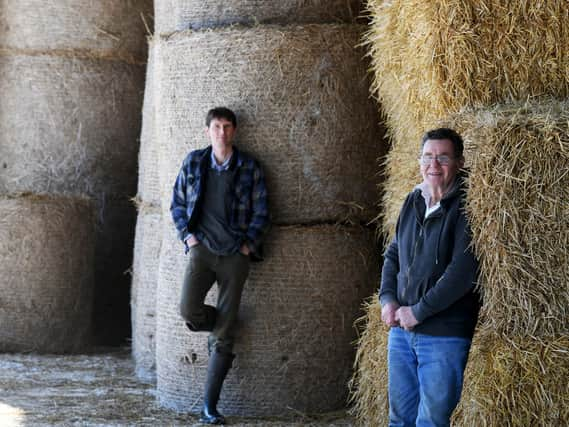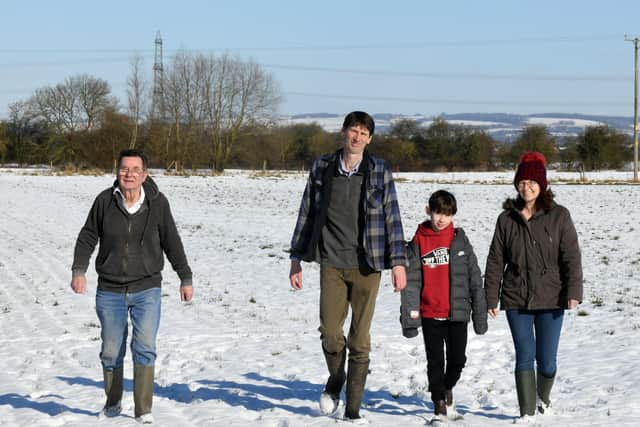Farm of the Week: Improving plant and bird life on the banks of the Pocklington Canal


Stephen Ridsdale has been at the helm since the mid-2000s with his father Terry, brother Ian and mum June also in the partnership.
“We are primarily an arable farm growing wheat, barley, beans and oilseed rape across our 250 acres with two farms. Walbut Mill Farm in the next village of Thornton is the other,” said Stephen. “They are about three miles apart. The land joins up by the side of Bielby Beck and Pocklington Canal.”
Advertisement
Hide AdAdvertisement
Hide AdCereal crop establishment was uppermost in Stephen’s mind in September last year as he sought to put behind him the nightmare that he and many had experienced in 2019.


“Our winter wheat varieties Revelation and Extase, the latter new for this year, were drilled across 40 acres and winter barley varieties Cassia and Orwell on 50 acres by 11am, September 23,” said Stephen.
The date will strike a chord with all East Riding arable farmers and those further afield. That was when the rains started and seemingly didn’t stop the year before.
Stephen and Ian were wholly vindicated in going earlier as the rains came again just as they completed drilling last year.
Advertisement
Hide AdAdvertisement
Hide Ad“After the previous year’s debacle we tried to get our 2021 cereal harvest established as early as possible,” said Steve.
“We normally average around 3.5 tonnes per acre but a combination of the difficult conditions in autumn 2019 and then drought problems in March and April 2020 when it didn’t rain at all saw us average around 3 to 3.2 tonnes on what we managed to establish in September, but only two tonnes on later establishment we managed in very wet conditions in October.
“Our medium loam soil is subject to drought when the rains don’t come because the subsoil is sand. That became another problem last year. Fortunately, we have an irrigation licence and Bielby Beck running through Common Farm is a natural source for our Bauer reel, but we didn’t start irrigating until May 12. If we had started in April we may have made a difference.”
The Ridsdales store all of the grain on the farm and following Stephen’s expectation of a poorer 2020 harvest result, he made what has so far turned out to be a wise decision as the wheat price is currently riding high at around £200 per tonne. He has sold some at just below this price so far.
Advertisement
Hide AdAdvertisement
Hide Ad“Few of us who are able to store our grain on farm manage to market at exactly the right moment. If we all knew those timings, we probably wouldn’t be farming. It’s a real crystal ball job, but it was pretty obvious to me, and I would imagine most others, that the wheat price would rise with a poor yield anticipated from the 2020 harvest, and I held on to our grain from the 2019 harvest hoping that would be right.”
All of Stephen’s wheat and barley is grown for feed. His winter barley averaged three tonnes last year and normally averages between 3 -3.25 tonnes per acre. He also grows spring barley and will drill 26 acres of Propino at the end of March. While the variety is generally regarded as a malting barley Steve explains why he grows it for feed.
“Our grain store is based around keeping things simple. It’s all feed wheat in one side and feed barley in the other. As we use nitrogen to combat drought we can’t grow the barley for malting as it would then not match what is required by maltsters.”
Winter beans and oilseed rape make up the rest of this year’s cropping, but changes are at hand, says Stephen.
Advertisement
Hide AdAdvertisement
Hide Ad“We have 15 acres of winter beans. We feed some to our cattle along with some barley, but our spring barley acreage is down from 43 acres and this will be our last year growing oilseed rape, of which we have 27 acres this year. We also have 30 acres of grass and make our own hay.
“The farm is now in Mid-Tier Countryside Stewardship and that’s why we are changing,” said Stephen.
“This year we will be growing 11 acres of wildbird mix and 31 acres of rare arable weeds to re-establish plant populations such as corn marigolds.
“I remember them being a nuisance years ago and we thinned them out but now the Government wants to see more of them. In the autumn we will also put in a two-year legume across 27 acres which, with its organic matter, will do the soil a power of good and in the long term we should achieve better wheat and barley.”
Advertisement
Hide AdAdvertisement
Hide AdStephen sees the stewardship route as a way in which he and Ian can use their time more wisely, as well as having an impact on soil health and wildlife.
“Ian has built his side of our overall business through diversifying into air conditioning of tractors, combines and potato stores. He’s also now very involved in the vacuum cooling sector, particularly important for perishable produce such as lettuce and flowers.
“Many of the flowers being bought for loved ones for Valentine’s Day will have been vacuum cooled to import from all around the world. Growing less crops may offer Ian and I the opportunity to expand on the business he has created over many years.”
The cattle side of the farm remains Terry’s domain. “Dad wouldn’t miss market day up in Wooler every October,” said Stephen. “He and I go up and buy a wagon load of 12-month old heifers at between 390-420 kilos every year.
Advertisement
Hide AdAdvertisement
Hide Ad“They’re generally Limousin crosses from two or three farmers. We bought 43 last year. We sell them at York livestock market at 550-620 kilos in April/May.”
Hugo, Stephen’s grandfather, purchased Common Farm in 1960 and Walbut Mill Farm in 1967.
Stephen studied at Harper Adams where he earned his degree in Agriculture and Animal Science. He married Sara in 2004, and they have a son, Thomas.
Comment Guidelines
National World encourages reader discussion on our stories. User feedback, insights and back-and-forth exchanges add a rich layer of context to reporting. Please review our Community Guidelines before commenting.